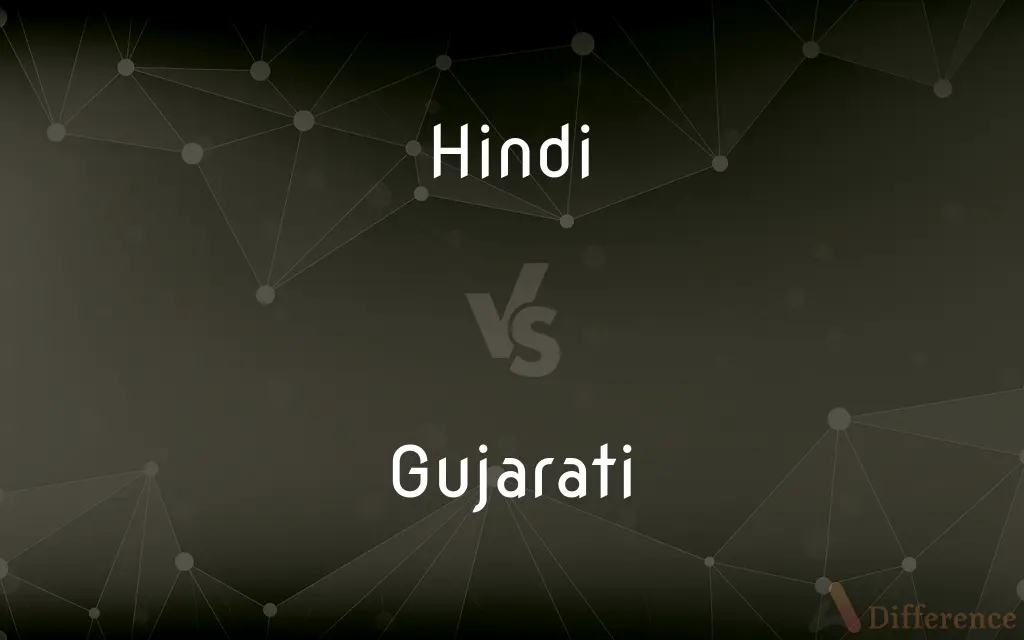Hindi vs. Gujarati — What's the Difference?
By Maham Liaqat & Fiza Rafique — Updated on March 27, 2024
Hindi and Gujarati are both Indo-Aryan languages spoken in India, but Hindi is the primary language of the northern regions and is one of India's official languages, while Gujarati is the state language of Gujarat in the west.

Difference Between Hindi and Gujarati
Table of Contents
ADVERTISEMENT
Key Differences
Hindi is predominantly spoken in the northern parts of India and serves as one of the country's official languages, along with English. It uses the Devanagari script for writing, which is also employed by several other Indian languages. On the other hand, Gujarati is primarily spoken in the western state of Gujarat and uses the Gujarati script, which, like Devanagari, is derived from the Brahmi script but has its unique characters and style.
In terms of phonology, Hindi includes several sounds that are not found in Gujarati, such as aspirated consonants and retroflex sounds. Hindi's phonetic system is somewhat more complex due to its larger phoneme inventory. Whereas Gujarati has its phonetic distinctions and tends to have a simpler vowel system, with fewer distinctions among vowels compared to Hindi.
Grammatically, both languages share some common features typical of Indo-Aryan languages, such as SOV (Subject Object Verb) order and the use of postpositions. However, there are differences in verb conjugations, the use of auxiliary verbs, and the application of gender and plural markers. Hindi grammar is often considered to have more levels of formality reflected in verb forms and pronouns, while Gujarati grammar might present a more straightforward approach in some aspects.
Vocabulary in both languages is largely derived from Sanskrit, yet they have also incorporated words from Persian, Arabic, and English, among others. Hindi, being more widely spoken and taught, has a higher incidence of loanwords from these languages, especially Persian and English, in its standard form. Gujarati, while also incorporating foreign vocabulary, retains a stronger presence of words of Sanskrit origin and has unique contributions from Portuguese and other languages due to historical trade connections.
Culturally, both languages reflect the rich heritage of their speakers. Hindi is often associated with Bollywood cinema, which has contributed to its spread and popularity. Gujarati, meanwhile, has a strong literary tradition and is known for its business acumen, with Gujarati speakers having a significant impact on commerce and trade in India and abroad.
ADVERTISEMENT
Comparison Chart
Geographic Region
Northern India
Western India (Gujarat)
Script
Devanagari
Gujarati
Phonology
Larger phoneme inventory, complex sounds
Simpler vowel system, fewer retroflex sounds
Grammar
More levels of formality, complex conjugations
Straightforward verb conjugations, different use of markers
Vocabulary
More Persian and English loanwords
Stronger Sanskrit influence, unique loanwords from trade languages
Cultural Influence
Bollywood cinema, widespread popularity
Rich literary tradition, significant in commerce and trade
Compare with Definitions
Hindi
An Indo-Aryan language with extensive use of Devanagari script.
हिंदी भारत में बोली जाती है (Hindi is spoken in India).
Gujarati
Grammar features straightforward verb conjugations.
હું જાઉં છું (I am going) shows verb conjugation.
Hindi
Known for complex phonology including aspirates and retroflex sounds.
ख़रीदना (to buy) showcases aspirated sounds.
Gujarati
Known for a strong literary tradition and business acumen.
Gujarati literature and entrepreneurs are globally recognized.
Hindi
Incorporates Persian and English loanwords.
स्टेशन (station) from English.
Gujarati
An Indo-Aryan language using the Gujarati script.
ગુજરાતી ગુજરાત રાજ્યમાં બોલાય છે (Gujarati is spoken in the state of Gujarat).
Hindi
Reflects formal and informal speech levels.
तू, तुम, आप (you) indicate increasing levels of formality.
Gujarati
Simpler vowel system with fewer distinctions.
ફળ (fruit) exemplifies vowel sounds.
Hindi
Central to Bollywood film industry.
Bollywood movies often feature Hindi songs and dialogues.
Gujarati
Rich in Sanskrit-derived vocabulary with unique loanwords.
નાસ્તો (snack) shows influence from Portuguese.
Hindi
Hindi (Devanagari: हिन्दी, IAST/ISO 15919: Hindī), or more precisely Modern Standard Hindi (Devanagari: मानक हिन्दी, IAST/ISO 15919: Mānak Hindī), is an Indo-Aryan language spoken chiefly in India. Hindi has been described as a standardised and Sanskritised register of the Hindustani language, which itself is based primarily on the Khariboli dialect of Delhi and neighbouring areas of Northern India.
Gujarati
The Indic language of Gujarat.
Hindi
An Indic language of northern India, derived from Sanskrit and written in the Devanagari script. It is the fourth most widely spoken language in the world, with more than 250 million people speaking it as their first language.
Gujarati
A native or inhabitant of Gujarat.
Hindi
Relating to Hindi.
Gujarati
A member of the people of Gujarat
Hindi
A group of vernacular Indic dialects spoken in northern India.
Gujarati
The Indic language spoken by the people of India who live in Gujarat in western India
Hindi
The literary and official language of northern India that is based on these dialects. It is written in Devanagari and uses Sanskrit as a resource language.
Hindi
The name given by Europeans to that form of the Hindustani language which is chiefly spoken by native Hindus. In employs the Devanagari character, in which Sanskrit is written.
Hindi
The most widely spoken of modern Indic vernaculars; spoken mostly in the north of India; along with English it is the official language of India; usually written in Devanagari script
Hindi
Of or relating to or supporting Hinduism;
The Hindu faith
Common Curiosities
Can Gujarati speakers easily learn Hindi?
Generally, yes. Due to linguistic similarities and cultural exchange, Gujarati speakers can often learn Hindi with relative ease.
What role does religion play in Hindi and Gujarati literature?
Both have rich literary traditions influenced by religion, with notable works inspired by Hinduism, Jainism, and other faiths.
Which language has a more complex sound system?
Hindi, with its broader array of sounds, including aspirates and retroflex consonants, has a more complex sound system.
How do the educational systems in India accommodate both languages?
Indian schools offer education in multiple languages, including Hindi and Gujarati, with students often learning both along with English.
How do the scripts of Hindi and Gujarati differ?
a
How significant is the cultural impact of Hindi compared to Gujarati?
Hindi has a broader cultural impact globally, largely due to Bollywood, whereas Gujarati has made significant contributions in business, literature, and regional traditions.
Are there bilingual Hindi-Gujarati speakers?
Absolutely, especially in regions where both communities coexist or in families with mixed heritage.
Is Hindi understood in Gujarat?
Yes, due to Hindi's status as an official language in India, it is widely understood in Gujarat.
Do Hindi and Gujarati share any literature?
There is some shared cultural and literary heritage due to their common Sanskrit roots, but each language boasts its unique literary tradition.
Are Hindi and Gujarati mutually intelligible?
They have some degree of mutual intelligibility due to similar grammar and vocabulary, but significant differences in phonology and vocabulary can pose challenges.
Is Gujarati influenced by other regional languages of India?
Yes, Gujarati has been influenced by neighboring languages, including Marathi and Hindi, as well as languages from historical trade partners.
What is the role of Hindi in Indian government and administration?
Hindi, along with English, serves as an official language used in government and administrative functions across India.
Share Your Discovery

Previous Comparison
Gormand vs. Gourmand
Next Comparison
Tardy vs. DelayedAuthor Spotlight
Written by
Maham LiaqatCo-written by
Fiza RafiqueFiza Rafique is a skilled content writer at AskDifference.com, where she meticulously refines and enhances written pieces. Drawing from her vast editorial expertise, Fiza ensures clarity, accuracy, and precision in every article. Passionate about language, she continually seeks to elevate the quality of content for readers worldwide.















































